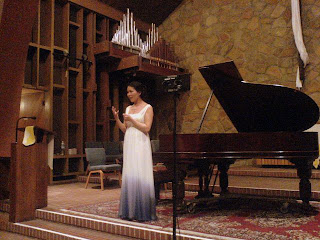
I attended Heidi's concert, this Saturday night in Berekeley. It's held as part of the Trinity Chamber Music Series, and was set in a small, intimate church (that could seat maybe 50 people).
She would first explain the piece, the composer, the context, the mood for about a couple of minutes, then play the piece.
Here's the program:
- Piano Sonata No. 32 - Haydn
- Prelude, Chorale and Fugue - Franck
- Arabesques on Strauss' Blue Danube Waltz - Schulz Evler
- 12 Preludes Book 2 - Debussy
There was a wonderful after-party that was kindly hosted by Heidi's husband's coworker and his family.
